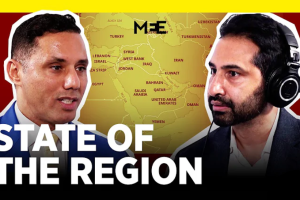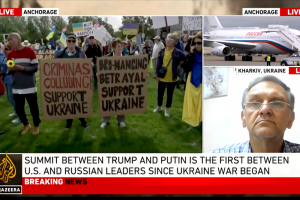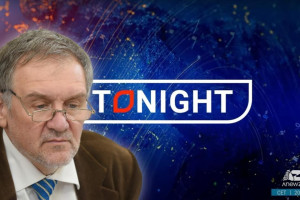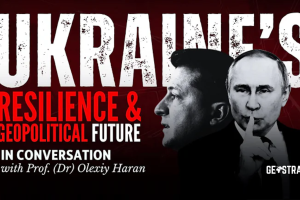MONTREAL – Ukrainians were interested in joining the European Union before the Euro-Maidan, but it was not at the top of their list of nation-building priorities. The idea of Ukrainians identifying themselves with Western Europe, rather than with Russia, did not generate enough power to mobilize the nation until 2014.
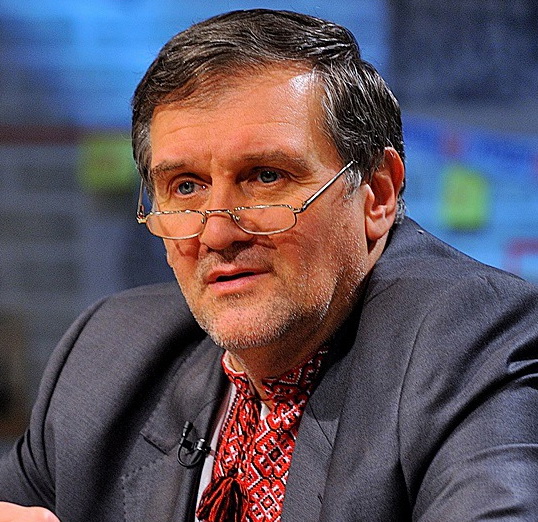 In a recent lecture at the Shevchenko Scientific Society’s chapter in Montreal, Olexiy Haran, professor of comparative politics at the National University of Kyiv Mohyla Academy and the academic director of the Democratic Initiatives Foundation, reviewed the events and the Ukrainian people’s attitudes that shaped Kyiv’s policy over the last life-changing four years.
In a recent lecture at the Shevchenko Scientific Society’s chapter in Montreal, Olexiy Haran, professor of comparative politics at the National University of Kyiv Mohyla Academy and the academic director of the Democratic Initiatives Foundation, reviewed the events and the Ukrainian people’s attitudes that shaped Kyiv’s policy over the last life-changing four years.
To begin with, it was only after then-President Viktor Yanukovych’s rejection of Ukraine’s future membership in NATO, his subsequent refusal to sign the Association Agreement with the EU, and only after the Euro-Maidan that public opinion toward Ukraine’s membership in these organizations changed.
What was the scene before all that? A poll taken back in February 2013 by the Kyiv International Institute of Sociology (KIIS) showed that there were four distinct streams of thought among Ukrainians at the time: 36.6 percent of those polled favored joining the EU; 37.5 percent supported membership in the Customs Union with Russia, Belarus, Kazakhstan, Kyrgyzstan and Armenia; 10.7 percent believed that Ukraine should join neither the EU nor the Customs Union, and 15.2 percent remained undecided. Basically, the majority of the population was split between two camps: half wanted closer ties with Russia, while the other half believed that Ukraine’s chances for a better future lay with the European Union. In an effort to accommodate this split in the nation and to offset the possibility of destabilization, Prof. Haran explained, the government in Kyiv implemented its multi-vector diplomacy with the Eurasian vector and the NATO vector balancing each other, as it were.
This policy, however, was challenged by circumstances. Under the influence of Moscow’s support for Mr. Yanukovych and, more dramatically, under the impact of Russia’s annexation of Crimea and the invasion of the Donbas, the belief that Ukraine could balance or consolidate the influence of both Russia and Europe disintegrated. More importantly, the Russian violation of Ukraine’s sovereignty fostered a feeling of solidarity among Ukrainians – religion or ethnic origin notwithstanding – and gave rise to a new sense of national identity and unity.
Circumstances in countries around the world also played and continue to play an important role in determining Ukrainians’ thinking, as well as their government’s policies, Prof. Haran commented. Last spring there was deep disappointment at the Dutch rejection of the EU-Ukraine Association Agreement. Understandably there was anxiety over the referendum in Italy, and now there’s worry over Brexit and how that might affect the EU’s attitude to accepting Ukraine as a new member. The rise of populism in France is troubling to the supporters of the development of a democratic pluralistic society in Ukraine. So, most Ukrainians found it reassuring that the extreme right candidate for the presidency in Austria lost the elections. On the other hand, the outcome of elections in France and Germany will be very closely followed in Ukraine because, should these two countries favor an inward turn, Ukraine will have lost its most important champions. But, Ukrainians find it reassuring that Angela Merkel agreed to another term of office.
Right now, the big worry is over President Donald Trump and his unpredictability. As Prof. Haran said, Ukrainians know that European politicians condemn Mr. Putin’s tactics in Ukraine, and that they will continue to support sanctions against Russia. But they don’t know what will be the long-term attitude toward Ukraine or toward the international obligations of the U.S. under the Trump administration.
Domestic affairs are no less interesting. A noteworthy shift in attitudes has taken place last year in three regions of Ukraine: in the south (Mykolayiv, Odesa and Kherson oblasts), in the east (Dnipropetrovsk and Zaporizhia oblasts), and in the Donbas (in the two-thirds of the Donetsk and Luhansk oblasts controlled by Ukraine). Again, according to data compiled by the Kyiv International Institute of Sociology, support in the south for joining the EU has remained constant: it was 26 percent in September 2013 and 26.9 percent in September 2016. Back in 2013, almost half of the people polled – 45.7 percent – had supported the Russia-led Customs Union with only 23.6 percent being in favor of the EU. What’s significant, Prof. Haran noted, is that before the Maidan, 11.5 percent of the region’s population believed that Ukraine should join neither the EU nor the Customs Union. But by 2016, that percentage increased to 38.8 percent. Even though some of the support for that idea comes from the previously undecided, it still means that Ukrainians’ trust in the Customs Union has eroded and the feeling for going-it-alone has increased.
In the east, the support for the EU went from 26.4 percent in September 2013, to 31.4 percent in September 2016. At the same time, the number of those in favor of the Custom’s Union dropped from 46.6 percent to 21.9 percent.
In the Donbas things are a little more complicated. Back in 2013 support for joining the EU was at 18.4 percent, but by September 2016 it had dropped to 8.7 percent. Support for joining the Russia-led Customs Union suffered a similar decline: the 61 percent support it enjoyed in 2013 plummeted to 30.2 percent by September 2016. Significantly, the number of people in the Donbas who think that Ukraine should stay away from membership in both the Russia-led and the Europe-led international organizations has risen. In 2013 only 9.5 percent of residents of the Donbas shared that view, but by 2016 more than half of the population of the region, 51.6 percent, supported the idea. Undoubtedly these changes in the thinking of Ukrainians living in the area present a dilemma for the policy-makers in Kyiv.
Prof. Haran said he is convinced that the ongoing immigration crisis in Europe, the April 2016 Dutch referendum, Brexit, the delay on visa-free travel for Ukrainians, the Minsk accords, the failed ceasefire – not to mention the escalating numbers of the displaced, the dead and the wounded – are all issues that have had a profound influence on Ukrainian thinking. Naturally, the perception of the EU is affected by these events, and that perception is not necessarily constant.
If support for the EU seems to be fluctuating, Prof. Haran explained, it’s because the reality of integration into the European community is seen as being too remote to be real. For many people, the idea of EU membership did not take on realistic dimensions until they began to see reforms mandated by membership in the EU being implemented in their own region or city.
Another case in point: according to a Carnegie Europe report, “What Do Ukrainians Actually Think?” by Gwendolyn Sasse published January 16, a poll conducted by the Ilko Kucheriv Democratic Initiatives Foundation and the Razumkov Center shows that 44 percent of the Ukrainian respondents thought that visa-free travel was important, but 50 percent believed that it was not. The author of the article suggests that this is “a reflection of who can realistically make use of this right” rather than opposition to the idea. In other words, as Prof. Haran said in his Montreal lecture, integration into a large international community has turned out to be far more complex than the heightened expectations of the Maidan had led people to believe.
What is truly troubling Ukrainians is the failure of the Minsk process. Economic sanctions may be hurting Russian investments, but not its determination to take the Donbas or to destabilize Ukraine. At the same time, Ukraine is being pressured at the talks table to grant the occupied territory special status and the right to hold elections there. Kyiv is reluctant to do that because that would imply conceding defeat. Even if Ukraine were to agree to allow elections in the occupied territory, important questions remain unanswered: What laws would govern elections in the war zone? Would the status of other regions in Ukraine have to change as well? What would happen to the idea of territorial integrity and the future security of Ukraine?
“All Ukrainians,” Prof. Haran said, “want peace, but not peace at any price.” So the stand-off continues. In the meantime, the war in Ukraine is changing political alignment outside the country. Although the war is no longer headline news and pundits around the world are debating whether it has become a “frozen war” or “the new normal,” the conflict is making East European countries decide whether they want to be aligned with Eurasia or with Western Europe.
In the Western international community, Prof. Haran said, the war has fostered a better understanding of Eastern Europe and its historic relationship with Russia, and it has consolidated various countries’ views on Putin’s politics. So, how Ukrainians think really matters, because their thinking will have a direct influence on government policy and, by extension, on their country’s place in the world. In this respect, Prof. Haran believes it is a very positive sign that Ukrainian identity is now associated with national awareness and national pride rather than with regional loyalties. This makes it more likely that Ukrainians will not compromise their homeland’s integrity in order to achieve peace.
As difficult as it may be to believe, the wartime hardships and suffering have brought some significant benefits too. It is remarkable, Prof. Haran noted that, despite international pressure, Ukrainian diplomats have continued their dialogue with Western and Russian diplomats. He particularly commended the work done at the United Nations. Among other things, it meant raising international awareness of the complexities of the situation in Ukraine, as well as documenting Russian lobby groups in countries around the world and tracking their anti-Ukrainian propaganda. The pressure brought to bear on Kyiv by the EU put the reform of Ukraine’s armed forces on fast forward as a result of which the Ukrainian military is now capable of holding its own against the Russian armed forces massing at the border.
It is also noteworthy that the war has raised the profile of Ukrainian scholarship at international conferences, such as the seminars of PONAR – the Program on New Approaches to Research and Security in Eurasia – one of which was held at McGill University in Montreal last December under the sponsorship of the Elliott School of International Affairs at George Washington University. Two Ukrainians, Prof. Haran, and Prof. Yuryi Matsiyevsky of the National University of Ostroh Academy, introduced the scholars from various countries to Ukraine’s perspective on the EU-Eurasian relations.
After the two-day event, Prof. Haran spoke at the Shevchenko Scientific Society and Prof. Matsiyevsky, author of the Ukrainian-language book “The Hybrid Trap: The Zig-Zag Transformation of Political Regimes in Ukraine (1991-2014)” returned to Ukraine.
In their presentations at this forum both scholars emphasized that what Ukrainians think matters.
Alexandra Hawryluk is a journalist working in Montreal.





